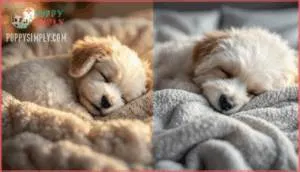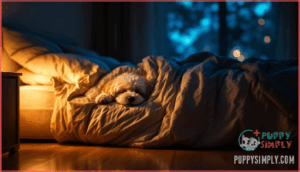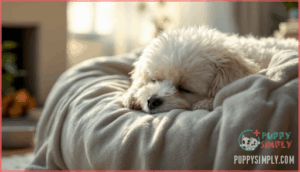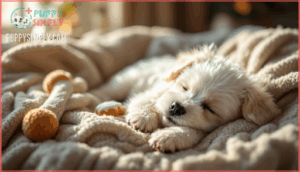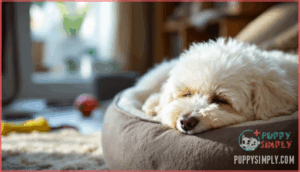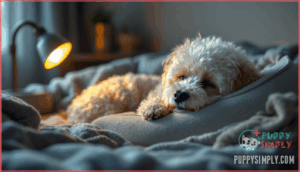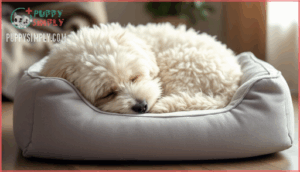This site is supported by our readers. We may earn a commission, at no cost to you, if you purchase through links.
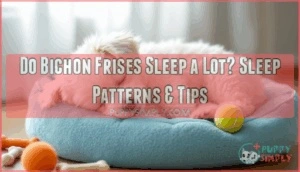
Puppies need even more—up to 20 hours—while seniors may snooze 15 hours as their bodies slow down. Several factors affect how much your Bichon sleeps, from their activity level to underlying health conditions.
Understanding what’s normal helps you spot when excessive drowsiness signals a problem versus when your pup is simply recharging for their next burst of playful chaos.
Table Of Contents
- Key Takeaways
- How Much Do Bichon Frises Sleep?
- Bichon Frise Sleep Patterns
- Do Bichons Sleep When Owners Do?
- Why Might My Bichon Sleep More Now?
- Promoting Sleep in Bichon Frises
- Signs of Excessive Sleep in Bichons
- Signs of Insufficient Sleep in Bichons
- Sleep Tips for Senior Bichon Frises
- Ideal Sleep Spots for Bichons
- Unique Bichon Frise Sleeping Positions
- Frequently Asked Questions (FAQs)
- What temperature is ideal for a sleeping bichon frise?
- How can I get my bichon frise to sleep later in the mornings?
- Can Bichon Frises sleep through the night?
- Do Bichon Frises dream while sleeping?
- How to transition a Bichon to new sleep schedule?
- Should Bichon Frises nap during the day?
- What bedding material is best for Bichons?
- Conclusion
Key Takeaways
- Adult Bichon Frises typically sleep 12–14 hours daily, while puppies need 18–20 hours and seniors may rest up to 15 hours as their metabolism slows and joints become less comfortable.
- Sudden changes in your Bichon’s sleep patterns—either sleeping significantly more or less than usual—can signal underlying health problems like diabetes, joint issues, or thyroid conditions that need veterinary attention.
- Quality sleep depends on a balance of mental stimulation and physical exercise, with daily activities like food puzzles, short training sessions, and 30–60 minutes of exercise helping your Bichon settle into restful sleep.
- Your Bichon’s sleeping position reveals their comfort level and trust, with back-sleeping showing complete security, side-sleeping indicating deep relaxation, and curled-up positions providing warmth conservation and instinctive protection.
How Much Do Bichon Frises Sleep?
How much sleep does your Bichon Frise actually need? The answer depends on age, health, and daily activity levels. Adult Bichon Frises sleep an average of 12–14 hours per day, while puppies need considerably more—between 18–20 hours—to support their rapid growth and brain development. These puppy sleep needs reflect intensive physical changes happening during their early months. Senior Bichon Frises often sleep longer as well, sometimes matching or exceeding their puppy counterparts due to reduced energy and joint discomfort.
Breed sleep averages align with other small dogs, and sleep study findings confirm that domestic dogs generally rest 10–16 hours daily depending on age. Your Bichon Frise’s sleeping habits will likely mirror your own routine to some degree. Any sudden changes in sleep duration could signal health concerns, so monitoring your dog’s typical patterns matters.
A comfortable bed is essential for improving sleep quality. Adequate exercise and mental stimulation promote better Bichon Frise sleep quality overall.
Bichon Frise Sleep Patterns
Your Bichon’s sleep needs change as they grow from puppyhood into adulthood. Understanding these age-related patterns helps you know what’s normal for your furry companion.
Let’s look at how sleep requirements shift during your Bichon’s first year of life.
Newborn to 6 Months
During those first few months, your Bichon Frise puppy’s sleep needs are extreme—newborns can sleep up to 90% of the day. This isn’t laziness; it’s when growth hormone release happens, building strong bones and muscles.
Between 3-6 weeks, expect around 18 hours of sleep daily as their eyes open and coordination develops. From 7-12 weeks, teething and sleep become intertwined—your pup still needs that 18-hour mark even while exploring their new world. The weaning impact also affects energy levels during this phase.
As they approach 4-6 months, Bichon Frise puppy sleep patterns shift slightly to 14-16 hours as curiosity peaks. Remember, adequate sleep and puppy development go hand-in-hand—those naps aren’t optional for growing Bichon Frise puppies; however, keep in mind that regular physical activity is also vital for their overall well-being.
7 Months to 1 Year
Between 7 months and 1 year, your Bichon Frise puppy shifts toward adult sleep patterns. Adolescent sleep needs stabilize around 12-14 hours daily, though growth spurts and teething impact may temporarily increase rest time.
Activity changes become noticeable—your pup displays high alertness during waking hours but crashes harder afterward. Training effects also play a role; mental stimulation from learning commands tires them out just like physical exercise does. You’ll notice more predictable sleeping habits forming as puppy development continues.
- Bichon Frise puppy sleep decreases to 12-14 hours as they mature
- Growth spurts and final teething phases can temporarily boost sleep needs
- One-year-old Bichons may sleep as little as 12 hours while staying highly alert
- Training sessions mentally exhaust puppies, encouraging deeper rest periods
- Activity changes reflect increased stamina and curiosity during this developmental phase
Do Bichons Sleep When Owners Do?
Your Bichon’s sleep patterns will likely mirror yours since these companion dogs naturally sync with their owners’ routines. Studies show that dogs display parallel sleep-wake phases up to 70% of the time with their human partners, and Bichon Frises adapt to owner bedtime within just three days of joining a household.
This sleep synchronization isn’t random. Over 70% of Bichons sleep within two meters of their owners at night, reflecting their strong attachment behavior. Co-sleeping benefits both of you—dogs sleeping near owners show 25% lower overnight cortisol levels and experience fewer nocturnal awakenings.
Your own chronotype matters too. If you’re an early riser, your Bichon will likely wake before 7 a.m. Night owls tend to have Bichons with later sleep schedules and slightly more fragmented rest.
While this breed’s dependency on human activity schedules strengthens your bond, monitor your dog’s sleep quality. Environmental factors like consistent bedtime routines help stabilize their sleep cycles and support overall health.
Why Might My Bichon Sleep More Now?
If your Bichon suddenly seems drowsier than usual, you’re probably wondering what’s going on. A few key reasons might explain the change.
Let’s look at the most common culprits behind increased sleep in your pup.
Health Problems
When health issues disrupt your Bichon’s system, extra sleep often follows. Several medical conditions can drain your dog’s energy and cause increased fatigue. Some Bichon Frise health problems are more common than others, and recognizing them early helps you act quickly.
Common health conditions that may increase sleep include:
- Diabetes lethargy: This endocrine disorder affects about 1 in 300 dogs, with small breeds like Bichons at higher risk, causing persistent fatigue
- Joint discomfort: Luxating patella and Legg-Calve-Perthes disease reduce mobility, leading to compensatory rest
- Allergy impact: Up to 20% of Bichons face skin conditions that disturb rest quality through chronic itching
- Bladder stones: These painful urinary issues alter normal sleep behavior until treated
Watch for sudden changes in your Bichon’s rest patterns. If you notice increased sleeping paired with other symptoms, consult your veterinarian promptly to diagnose and address any underlying medical conditions.
Normal Aging
As your Bichon crosses the 10-year mark, you’ll notice changes rooted in normal biology rather than disease. Senior Bichon Frises naturally sleep 12 to 15 hours daily due to metabolic changes and reduced mobility. Sleep fragmentation increases, with shorter REM cycles but more frequent rest periods.
Cognitive decline may also develop, affecting awareness and behavior. These age-related health issues don’t mean something’s wrong—they’re expected adaptations. Your aging companion simply needs extra downtime to support tissue repair and energy regulation.
With proper care, lifespan extension to 18 years remains possible for these resilient small-breed dogs.
Promoting Sleep in Bichon Frises
If your Bichon isn’t getting enough quality sleep, you can help by making a few simple changes to their daily routine. Good sleep doesn’t just happen—it comes from the right balance of mental and physical activity during the day.
Here are three proven ways to encourage better rest for your pup.
Food Puzzles
You can think of food puzzles as a gym workout for your Bichon Frise’s brain. Cognitive enrichment through puzzle feeders provides mental stimulation that tires out your dog breed, leading to better sleep quality. Studies show dogs using food puzzles exhibit reduced stress and anxiety, which directly aids restful sleep. This approach also aids weight management by slowing eating and increasing activity.
- Hide kibble around the house so your Bichon Frise can use their nose to hunt for meals, combining mental stimulation with natural foraging behavior.
- Rotate puzzle feeders and treat-dispensing toys to keep the challenge fresh and maintain owner engagement in your dog’s enrichment routine.
- Try snuffle mats or frozen Kongs to provide longer-lasting activities that promote stress relief through repetitive, calming licking and searching behaviors.
Training
Training sessions work like a reset button for your Bichon Frise’s overactive mind, helping them wind down before bedtime. Short, focused training sessions of 5–10 minutes twice daily provide mental stimulation without overwhelming your puppy. Early socialization and positive reinforcement methods improve command success rates while addressing behavior challenges like stubbornness. Consistency in behavioral training reduces confusion and helps your dog settle into predictable routines that support better sleep.
| Training Benefit | Impact on Sleep | Best Timing |
|---|---|---|
| Mental stimulation | Reduces restlessness | Evening hours |
| Positive reinforcement | Builds calm associations | Before bedtime |
| Early socialization | Decreases anxiety | Throughout day |
| Behavioral consistency | Promotes routine | Same time daily |
Schedule training before your own bedtime so your Bichon becomes accustomed to your routine, then provide a cozy sleeping spot afterward.
Exercise
Physical activity works like a natural sleep aid for your Bichon Frise, burning off energy that might otherwise keep them awake. Adult Bichons need 30–60 minutes of daily exercise, while puppies follow the rule of 5 minutes per month of age, twice daily. Age adaptations matter—seniors do best with gentler 20–30 minute sessions that protect aging joints.
- Mix activity types: Combine walks with indoor games like fetch or puzzle toys for mental stimulation alongside physical exertion.
- Time it right: Schedule exercise 2–3 hours before bedtime to avoid overstimulation while ensuring your dog’s tired enough to settle down.
Safety considerations include avoiding hot pavement and maintaining proper hydration during physical activity.
Signs of Excessive Sleep in Bichons
When your Bichon starts sleeping beyond their usual 12 to 16 hours, it’s time to pay closer attention. Excessive sleeping in Bichon Frises often points to underlying health issues that need veterinary attention. Research shows that dogs sleeping more than 16 hours a day display potential symptoms worth investigating.
Watch for these key signs of excessive sleep:
- Lethargy symptoms like droopy eyes, sluggish movement, and frequent yawning even after rest
- Behavioral withdrawal such as reduced interest in walks, play, or responding to familiar cues
- Physiological signs including difficulty waking, disorientation upon rising, or sleeping through meal times
- Routine disruptions where your Bichon suddenly naps at unusual times or shows delayed responses to stimuli
Medical conditions like hypothyroidism, diabetes, arthritis, and heart problems commonly cause excessive sleeping in Bichons. If these changes persist beyond two weeks or you notice multiple warning signs together, schedule a vet visit promptly.
Signs of Insufficient Sleep in Bichons
Just as too much sleep signals trouble, too little rest also raises red flags. When your Bichon Frise sleeps considerably less than usual, it’s important to identify what’s disrupting their rest. Behavioral indicators like irritability, excessive barking, or hyperactivity often appear when dogs don’t get enough quality sleep. Physical symptoms include red or droopy eyes, frequent yawning, and a dull coat that’s lost its usual shine.
Sleep deprivation also creates cognitive impact. Your Bichon may struggle with training commands or seem less focused during playtime. Immune effects become visible too, as chronic sleep problems weaken their body’s defenses against illness. Lifestyle factors like noisy sleeping areas, inconsistent schedules, or lack of exercise contribute to these sleep problems.
Watch for these signs of insufficient sleep in your Bichon:
- Restlessness with pacing or constant position changes during rest periods
- Increased emotional reactivity to minor triggers like doorbells or passing cars
- Slowed reflexes and sluggish movement during walks
- Destructive chewing or unusual excitement patterns
- Difficulty settling down even after adequate daytime activity
If these Bichon Frise sleep patterns persist, consult your veterinarian to address underlying causes.
Sleep Tips for Senior Bichon Frises
When your Bichon doesn’t get enough rest, you’ll notice the difference. Senior Bichon Frises face their own set of sleep challenges that need special attention. Older dogs benefit from a consistent routine that aids their changing bodies and minds. Set regular feeding times and stick to predictable schedules—this helps stabilize their internal clock and reduces nighttime restlessness.
Here are four ways to aid better Bichon Frise sleep in older dogs:
- Invest in an orthopedic bed that relieves pressure on arthritic joints and provides proper support.
- Add gentle evening activity like short walks to tire them out without causing joint pain.
- Adjust dietary needs by feeding earlier in the evening and limiting water before bedtime to minimize nighttime bathroom trips.
- Focus on stress reduction by using nightlights for dogs with vision loss and keeping their sleeping area warm and draft-free.
These adjustments address common Bichon Frise sleep problems in aging dogs, helping senior dogs maintain quality rest despite physical limitations.
Ideal Sleep Spots for Bichons
Where your Bichon sleeps can make a real difference in how well they rest. You’ve got a few solid options, each with its own perks.
Let’s look at the most common sleep spots and what makes each one work.
Crates
For most Bichon Frises, a crate becomes their favorite retreat—a personal den where they feel protected and calm. When you introduce your Bichon to crate training gradually, they learn to see it as a cozy sanctuary rather than confinement.
Choose a 24-inch crate for your adult Bichon Frise, giving them enough room to stand and turn comfortably. Add soft bedding and a familiar toy to strengthen positive associations.
This sleeping environment aids housetraining by encouraging bladder control and reduces anxiety-related behaviors during travel or vet visits. Senior Bichons especially benefit from the secure space, which improves their sleep quality and minimizes nighttime wandering.
Dog Beds
While a crate offers security, a well-chosen doggy bed gives your Bichon freedom to stretch out during those 12–16 hours of daily rest. Look for orthopedic benefits like memory foam that bolsters joints and maintains shape for years.
Material durability matters—reinforced polyester withstands scratching while cotton canvas breathes well. Temperature regulation helps too, with cooling gel lowering surface heat in summer.
For hygiene maintenance, pick washable covers that reduce bacteria by 99%. Size suitability is key: choose dimensions about 24 inches long, giving your Bichon enough room for comfortable sleep arrangements without excess bulk.
Your Bed
Beyond the doggy bed, your bed offers co-sleeping benefits like stronger bonding and reduced anxiety. About 62% of small dog owners welcome their Bichon onto the mattress, especially in larger beds where placement at your feet or middle works best.
Keep hygiene concerns in check by regular grooming and washing bedding, since 86% of bed-sharing dogs carry common bacteria. Set clear behavioral rules about when your Bichon can join you to maintain your sleep quality and comfort.
- Establish boundaries: Decide if your Bichon sleeps under covers or on top, and stick to that routine.
- Monitor sleep disruptions: Most owners report their dog rarely disturbs rest, but watch for excessive movement.
- Address separation anxiety carefully: Co-sleeping helps anxious Bichons, but don’t let it worsen dependency issues.
Unique Bichon Frise Sleeping Positions
Your Bichon’s sleeping posture can tell you a lot about how they’re feeling. Dogs naturally shift between a few favorite poses throughout the day and night.
Let’s look at the most common ones you’ll see your Bichon settle into.
Curled Up
When your Bichon curls into a tight ball, it’s more than just adorable—it’s instinctual security at work. This position, where your dog tucks its paws and nose under its fluffy tail, serves multiple purposes. Small breeds like Bichon Frises adopt this sleeping habit in roughly 45–50% of rest episodes, considerably more than larger dogs. The curled-up position offers thermoregulation benefits by reducing heat loss by up to 12%, particularly helpful during cooler months. It also protects key organs, a trait inherited from wild ancestors.
This dog sleep position also indicates comfort factors—your Bichon feels secure enough to rest, though not completely vulnerable like belly-up sleeping positions.
| Aspect | Curled Position Details |
|---|---|
| Frequency | 45–50% of Bichon Frise sleep positions |
| Temperature Response | Increases in temps below 68°F |
| Heat Conservation | Reduces surface heat loss by 12% |
| Musculoskeletal Health | Minimizes joint stress, especially in seniors |
On Back
With paws up and belly exposed, your Bichon sleeping on its back is showing you the highest trust indicator. This vulnerable position appears in roughly 40% of adult Bichon Frises, particularly in warm environments above 70°F where it functions as a natural cooling mechanism.
You’ll notice this dog sleep position most often during REM sleep, when your Bichon’s muscles fully relax and you might catch some twitching or paddling movements. Snoring prevalence increases in this posture due to airway positioning. However, senior Bichons with joint discomfort may avoid back-sleeping as flexibility decreases with age.
If your Bichon frequently adopts this Bichon Frise sleep position, it signals deep comfort and security in your home.
On Side
When your Bichon stretches out on their side, they’re telling you everything’s right in their world. This sleeping position shows up in about 84% of dogs and signals deep trust and relaxation.
Side sleeping offers your Bichon some real benefits:
- Allows full body stretch and joint relief, especially important for senior dogs
- Permits easier entry into REM sleep for brain development and memory
- Promotes natural cooling when comfortable bedding or warmer temperatures influence their choice
You’ll often notice paw twitching during these side-sleeping sessions—that’s your Bichon dreaming peacefully. This common Bichon Frise sleeping habit reflects their contentment and indicates they feel safe enough to fully let their guard down.
Frequently Asked Questions (FAQs)
What temperature is ideal for a sleeping bichon frise?
Think of your Bichon’s sleep environment like a cozy nest—when the temperature is just right, they’ll rest deeply and wake refreshed. The ideal temperature for a sleeping Bichon Frise is between 75°F and 80°F. Their double coat and small size mean they lose heat quickly, so they prefer slightly warmer conditions than larger breeds.
If your home drops below 70°F, consider adding a warm blanket or moving their bed away from drafty areas. Watch for signs of discomfort like shivering or excessive panting, which signal the temperature needs adjustment for best sleep quality.
How can I get my bichon frise to sleep later in the mornings?
Establishing a consistent Bichon Frise sleep routine helps delay early wake-ups. Offer evening exercise to tire your dog out, then feed dinner 2-3 hours before bedtime. A quiet environment with dimmed lights encourages better sleeping habits.
Ignore demands like barking or pawing in the morning—wait for quiet behavior before responding. Gradually shift her schedule later by 15-minute increments.
Can Bichon Frises sleep through the night?
Most adult Bichon Frises can sleep through the night once properly trained, usually around 4-6 months of age. Consistent Adult Sleep Schedules and Puppy Sleep Training reduce Nighttime Potty Breaks.
Senior Sleep Issues and Environmental Night Factors like arthritis or temperature may cause nighttime waking.
Do Bichon Frises dream while sleeping?
Yes, your Bichon Frise does dream during sleep. Like all dogs, Bichons experience REM sleep cycles with rapid eye movements and brain activity patterns similar to dreaming humans.
You’ll notice twitching paws, soft barks, or facial movements—signs they’re processing daily experiences during these sleep stages.
How to transition a Bichon to new sleep schedule?
Old habits die hard, but changing your Bichon Frise sleep routine gets easier with consistency. Gradually shift bedtime by 15-minute increments while maintaining fixed meal times and calming pre-sleep activities.
This routine implementation reduces anxiety and helps your Bichon adjust naturally within two weeks.
Should Bichon Frises nap during the day?
Absolutely, daytime naps are normal for Bichon Frises at every age. Puppies need frequent naps to support growth, while seniors rest more due to aging. Even adult Bichons benefit from scheduled naps throughout the day to recharge.
What bedding material is best for Bichons?
Your Bichon Frise deserves a cloud-like retreat that bolsters their fluffy body through all those hours of rest. Look for allergen-free materials like bamboo or eucalyptus silk that repel dander, memory foam for joint aid, and machine-washable covers for cleaning ease.
Temperature-regulating fabrics keep your doggy comfortable year-round while assuring bed durability and best sleep quality.
Conclusion
Like Goldilocks testing beds, your Bichon needs the right balance—not too little sleep, not too much. Now you understand that do bichon frises sleep a lot isn’t a simple yes or no.
Watch for changes in sleep patterns, create comfortable rest spaces, and balance activity with downtime. If your Bichon suddenly sleeps considerably more or less than usual, contact your veterinarian.
Most importantly, remember that adequate sleep keeps your fluffy companion healthy, happy, and ready for whatever mischief awaits.
- https://www.fitwarm.com/blogs/news/is-bichon-frise-a-good-house-dog
- https://casper.com/blogs/article/how-many-hours-do-dogs-sleep
- https://www.sciencedirect.com/science/article/abs/pii/S1558787812001979
- https://www.awin1.com/awclick.php?gid=384255&mid=18971&awinaffid=970533&linkid=2867541&clickref=
- https://www.thesprucepets.com/why-dogs-sleep-so-much-4178938

